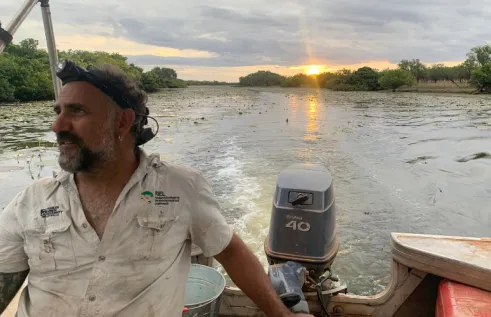RIEL seminar series
Conservation benefit-sharing framework in the Greater Serengeti Ecosystem, Tanzania
| Presenter | Juma Kegamba | |
|---|---|---|
| Date/Time |
to
|
|
| Contact person | E: RIEL.outreach@cdu.edu.au | |
| Location | Casuarina Campus, Building Yellow 1.1.39 and online | |
| Open to | Public | |
The Greater Serengeti Ecosystem (GSE) is critical to the economy of Tanzania but living as a neighbour to the protected areas of the region can be extremely difficult. This research has been assessing the effectiveness of benefit-sharing and compensation mechanisms that conservation institutions operate with local people living in and around the GSE. Conservation institutions have been sharing the benefits in the form of social services provision, livelihood provision and employment. No single category of benefit works for all communities.
The research has found that the benefits, particularly scholarships for children, are largely accepted and effective in securing community support for conservation, particularly those that are delivered by community-based conservation institutions rather than those delivered by government. Nevertheless, there is frequent conflict between communities and GSE authorities. This could be because the benefits provided are far less than the costs incurred from living with wildlife. Such losses include damage to crops, as well as death and injury to both people and livestock – in the area studied, an average of eight people are killed a year, and families may receive US$400 in ‘consolation’ money.
Local people living close to protected areas suffer greater loss to their livelihoods than those further away. Elephants are the most damaging to crops, and dangerous to people, while hyenas kill or injure the most livestock. A review of the policies showed that the central government retains tight control of revenue collection and benefit sharing. A review of the regulations around sharing benefits with communities found that they lack clear provisioning mechanisms or details for onground implementation. The seminar will conclude that a review of the benefit-sharing framework and its replacement with a more transparent system would benefit both communities and wildlife.
Juma Joseph Kegamba currently works as a Lecturer at the College of African Wildlife Management, Mweka, and has previously worked as a Game Warden at the Wildlife Division, in Tanzania. He holds a Master's degree in Environmental Management from Charles Darwin University and a Bachelor's degree in Wildlife Science and Conservation from the University of Dar es Salaam. His principal research interests are within the fields of community engagement, biodiversity conservation, ecosystem services and the human-wildlife interface.
Juma is currently undertaking PhD research at CDU on assessing the “Effectiveness of conservation institutional frameworks in benefit-sharing mechanisms with local communities in the Greater Serengeti ecosystem, Tanzania”. He has published two peer reviewed paper from his PhD research, has submitted a third paper, and has a fourth paper in preparation. In this seminar, Juma will present the main research outcomes and share personal experiences of working with local and Indigenous communities in the Greater Serengeti Ecosystem.
Related Events

STATE OF THE DIS-UNION: Media Literacy in the age of AI
The CDU Library is hosting a free panel discussion featuring Northern Territory journalists who will discuss media literacy, truth, and storytelling in the AI era. Attendees can learn how AI is transforming media, ask questions, and improve their understanding of navigating information in today's landscape.
Read more about STATE OF THE DIS-UNION: Media Literacy in the age of AI
Trophic dynamics of free-flowing tropical rivers
Colton Perna's PhD research explores how river flows and flooding shape freshwater fish communities in tropical rivers, using fatty acids to track how hydrology influences food webs and nutritional pathways. His findings highlight the critical importance of river flow and floodplain connectivity in sustaining productive aquatic ecosystems.
Read more about Trophic dynamics of free-flowing tropical rivers
Why Cross‑Cultural Communication Matters in Indigenous-focused Research
A cross‑cultural research partnership grounded in respect, shared knowledge, and educational equity. Discover how collaboration shaped a transformative PhD journey.
Read more about Why Cross‑Cultural Communication Matters in Indigenous-focused Research
